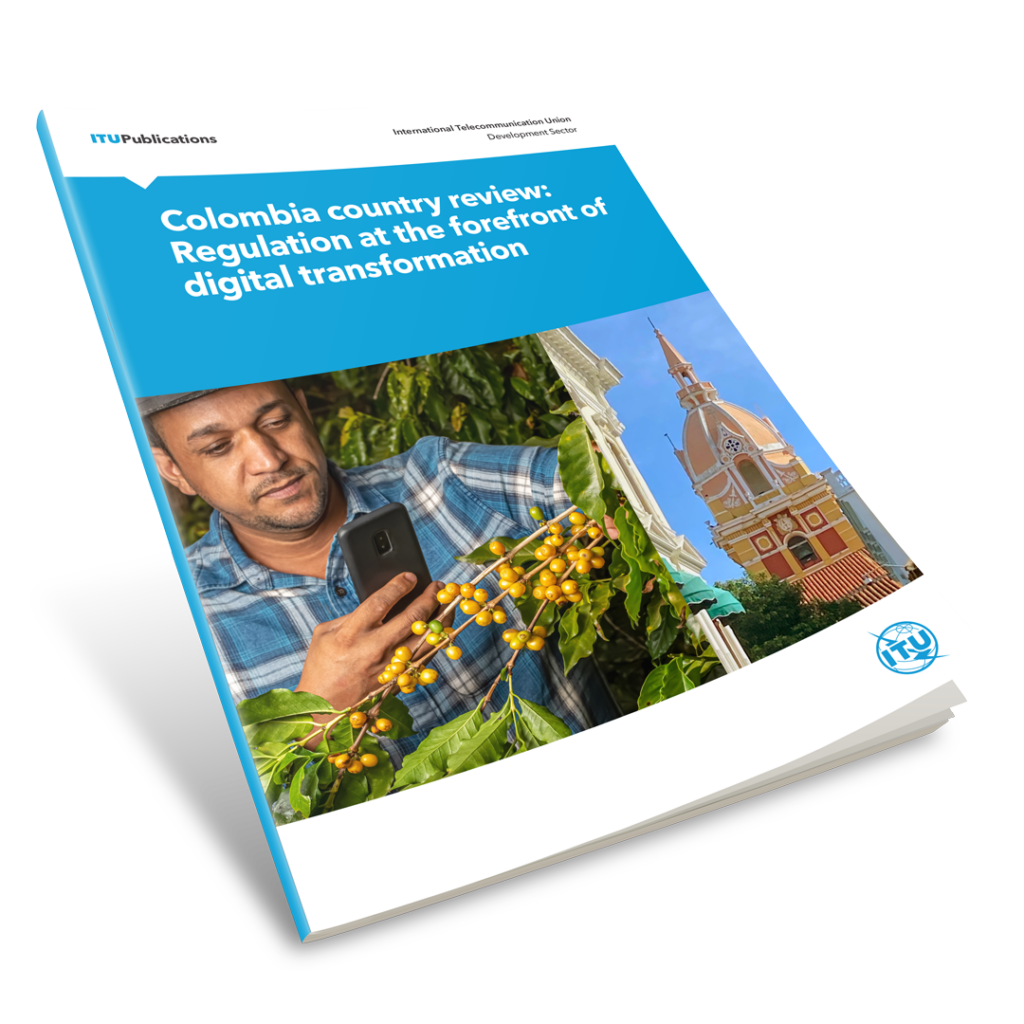International Telecommunication Union / Tecnología, Medios y Telecomunicaciones
“El Sector de Desarrollo de la Unión Internacional de Telecomunicaciones (UIT) ha publicado el documento denominado “Colombia country review: Regulation at the forefront of digital transformation”. Este reporte es parte de una serie de casos de estudio y revisiones de países en relación con la regulación digital colaborativa. Los estudios de casos recogen los logros alcanzados con mucho esfuerzo y proporcionan indicaciones de gran valor para otros países que buscan un camino similar.

El reporte para Colombia fue elaborado por Carlos A. Bello, socio de BGBG en el área de Tecnología, Medios y Telecomunicaciones, en su calidad de Experto de la UIT.
Acceso al documento
“Colombia country review: Regulation at the forefront of digital transformation”
Acceso a la biblioteca de los casos de estudio de los
diferentes países respecto al tema de regulación colaborativa
Colombia country review: Regulation at the forefront of digital transformation
Acknowledgements
This report was developed by the Regulatory and Market Environment Division (RME) of the ITU Telecommunication Development Bureau (BDT), with the support of ITU Regional Office for the Americas. It was elaborated by the ITU Expert, Mr Carlos Arturo Bello Hernández, Founding Partner, BGBG.
This country review incorporates important feedback and comments from the following institutions during the period August-December 2021:
- – Comisión de Regulación de Comunicaciones de Colombia (CRC)
- – Cámara Colombiana de Informática y Telecomunicaciones (CCIT)
- – Asociación Nacional de Empresas de Servicios Públicos y Comunicaciones (Andesco) ITU would like to thank all those who participated in the interviews for sharing their experience, views, and data. This country review is part of a series of case studies and country reviews developed in the framework of the ITU work stream on collaborative digital regulation with the financial support of the Republic of Korea.
Table of contents
Colombia country review: Regulation at the forefront of digital transformation
- Introduction
- 1.1 Fighting back from COVID-19
- 1.2 Digital transformation through collaborative digital regulation: The way forward
- From ICT to a digital economy and digital
- 2.1 Regulatory evolution in Colombia
- National collaborative governance
- 3.1 Collaborative digital regulation landscape
- 3.2 Colombia’s actions for digital transformation
- Policy design principles
- Digital development toolbox
- 5.1 ICT infrastructure and beyond.
- 5.2 Digital government policy
- 5.3 Cybersecurity
- 5.4 Data privacy
- Digital economy policy agenda
- Time to assess progress
- 7.1 Colombia National Development Plan 2018-2022
- 7.2 Govtech in Colombia
- 7.3 Self-assessment and developing a growth mindset
- Looking ahead
1 Introduction
This report reviews collaborative digital regulation and the digital economy in Colombia.
1.1 Fighting back from COVID-19
Prompt and decisive actions taken by the Government of Colombia have allowed the national economy to recover quickly from the effects of COVID-19. By June 2021, economic activity had recovered to 2019-levels, with an estimated growth of 9.5 per cent in 2021, according to the Economic Commission for Latin America and the Caribbean (CEPAL).1 COVID-19 also exacerbated existing income inequalities and expanded the informal labour market However, the labour market is expected to return to pre-pandemic levels by mid-2023.
Globally, the importance of connectivity for public and private sectors has been magnified by the COVID-19 pandemic. In Colombia, Internet penetration rates and connection speeds remain low and prices for fixed and mobile services are high.
1.2 Digital transformation through collaborative digital regulation: The way forward
Digital transformation has become part of the policy agenda of a growing number of countries to drive social development and economic prosperity. Digitalization, as a cross-cutting phenomenon, has a broad social and economic impact. It affects all sectors of the economy from agriculture to industry and trade, from household consumption to public services through its impact on productivity, employment, skills, services on offer and markets. It is changing production, delivery, consumption and lifestyle patterns. Through new means of communication, digital technologies are changing society.
Digital transformation needs a different approach to regulation, and a new regulatory paradigm has emerged that seeks to fast forward digital transformation for all, and that paradigm is embodied in the concept of collaborative digital regulation.
Based on a broad notion of generations of ICT regulation (see Box 2), G5 collaborative digital regulation marks a fundamental shift in the way regulation is executed. The G5 holistic approach brings together a wide range of stakeholders from policy-makers to single-sector and cross- sector regulators, and a wide range of market players. In addition, the focus on regulatory behaviour and its impact on markets, as well as social and economic development, brings to the fore the need to harmonize policy priorities, regulatory rules, and existing institutional frameworks across sectors that will leverage digitalization. This reflects the importance of the interplay between digital infrastructure, services and content across industries and national borders.

Acceso al documento
“Colombia country review: Regulation at the forefront of digital transformation”


 Brasil, Regulación en Transformación Digital
Brasil, Regulación en Transformación Digital